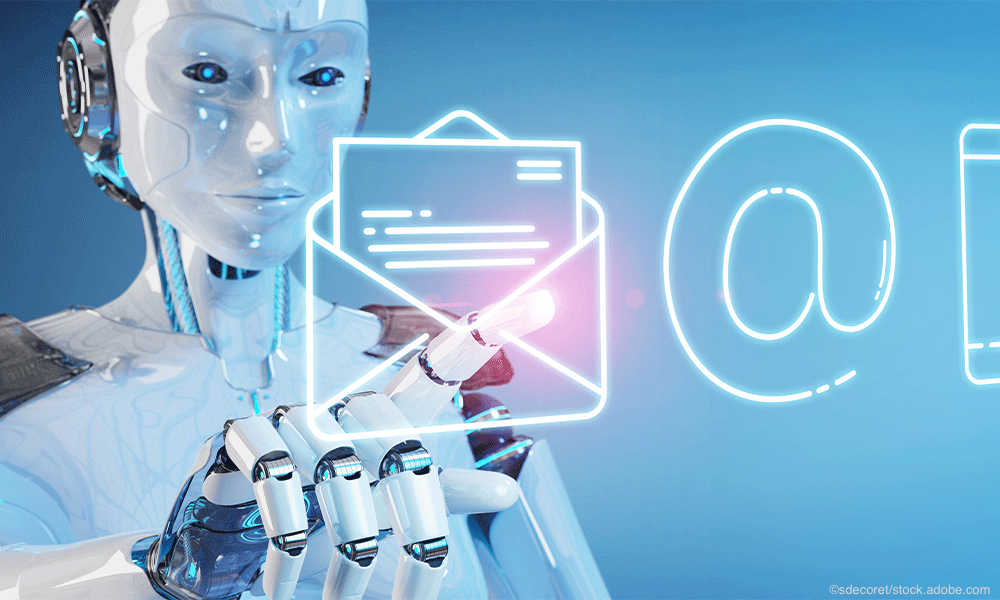How email AI can help your practice thrive
Email is one area ripe for AI innovation.

The use of AI-powered tools has been increasing around the globe. Chatbots, smart cameras, sorting robots, machine learning-guided text proofreading—the list of artificial intelligence (AI) applications goes on and on.
Email is one area ripe for AI innovation. Forward-thinking healthcare providers can leverage email AI in several ways, such as to protect their inboxes from hackers and to receive transcribed voicemails directly to their inboxes.
AI for email security
According to the FBI Internet Crime Report for 2020, targeted email attacks led to business losses of over $1.8 billion last year, including $29.1 million due to ransomware, often transmitted via email phishing campaigns.
Nearly 30% of all email attacks are launched from a highjacked email account belonging to a trusted employee or outside vendor, including 1.5 million sent from pirated Microsoft 365 accounts on a monthly basis in 2019.
In the face of this unrelenting assault, signature-based email security, whitelisting, and even modern, cloud-native security controls are hopelessly outgunned. From never-before-seen zero-day events, to dynamically generated malware variants that defy detection, attacks are growing ever more inventive and dangerous.
Predictive, AI-based email security is proving to be remarkably effective at protecting against today’s most advanced business email compromise (BEC) scams, phishing attacks, and other rapidly evolving email threats. Applying the Zero Trust security model to machine learning email AI tools provides the best protection.
Machine learning (ML) is a branch of AI that’s focused on recognizing patterns and learning from sets of labeled data to make predictive decisions. In the email security space, ML is shifting the prevailing defense paradigm from a reactive posture focused on chasing down known threats to a proactive approach that recognizes and even anticipates novel threats as quickly as they emerge.
Zero Trust is a security framework requiring all users, whether in or outside an organization’s network, to be authenticated, authorized, and continuously validated before being granted or keeping access to applications and data.
ML can be used in conjunction with the Zero Trust framework to protect your inbox. A predictive algorithm can require a special type of two-factor authentication for every email before it is delivered. In other words, two pieces of evidence must be present to authenticate that an email is truly legitimate.
This new piece of evidence will be unique to your business and change based on time and usage. In other words, it is difficult for bad actors to impersonate.
Visual voicemail
A patient might leave you a voicemail at a time when you cannot listen to the message in private. This opens you up to a HIPAA violation if someone overhears a voicemail containing PHI.
Visual voicemail leverages AI to automatically transcribe a voicemail into text, thereby eliminating the need to listen to incoming messages. Instead, the content of the message can be sent via HIPAA compliant email, along with the original sound recording file. As a result, you limit the risk of having others overhear potentially sensitive information.
Visual voicemail also saves you time because you don’t have to sign in to retrieve your messages or listen to a message multiple times. It provides access to messages from beyond your desk, on any digital device, making it a valuable tool for remote workers and distributed teams.
Conclusion
AI can be leveraged to solve innumerable business problems, including in the healthcare realm.
Predictive, AI-based email security which leverages the Zero Trust framework is already playing a very real, important role in helping thousands of industry-leading companies block email threats.
At the same time, by sending transcribed voicemails to your inbox, AI can keep your staff from unwittingly committing a HIPAA violation when they listen to patient messages in public.
These are only two examples of how email AI can help your healthcare business, but the sky's the limit.